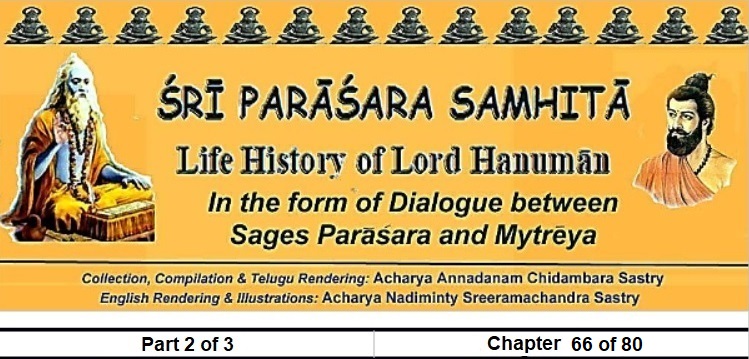
66th Chapter (Śaţşaşţitama Paţalah)
“The Story of the Wheel-Amulet Form of the Danger-Removing Holy Hymn”
(YantraSwaroopa Āpaduddhārak Stōtra Kathanam)
श्रीपराशरः
यन्त्रस्वरूपं वक्ष्यामि शृणुष्वमुनिपंुगव
दशकोणात्मकं चक्रं सर्वसिद्धिप्रदायकम्।। 1
ŚrīParaāśara:
“Oh! Best Sage! Mytrēya! I am telling about Wheel Amulet Form (yantraswaroopam). Listen. This ten-angled amulet bestows all types of achievement (1)
त्रिकोणं च चतुष्कोणं पव्म्चकोणं तथैव च
षट्कोणं च तथा यन्त्रमिति मंत्रविदो विदुः।। 2
Mantra exponents know that there are yantras (amulets) that are three, four, five or six angled. (2)
भूपुरत्रयसंयुक्तं शूलाद्यव्म्च मनोहरम्
प्रासादबालनृसिंहपव्म्चायतनषडङ्गकम्।। 3
One with three angular structures (bhoopura), one with a captivating trident in the beginning, one that has a mansion with pańcāyatana (a main and rest subsidiary structures) with six parts (şadańgas), (3)
चक्रांतरं प्रवक्ष्यामि सर्वलोकोपकारकम्
श्रीमदष्टाक्षरीचक्रं वक्ष्यामि मुनिपुंगव 4
Wheel Amulet Form (YantraSwaroopam)
Oh! Great Sage! I am telling about a wheel (cakra) amulet that is beneficial to all the worlds. That is the Śrīmadaşţakşaree (Auspicious Eight-lettered) cakra amulet. (4)
आदौ चंद्रं समालिख्य ह्यष्टकोणं च विन्यसेत्
तद्बाह्ये वृत्तमालिख्य द्वादशारमतः परम्।। 5
Drawing the candra (moon) sign first, eight angles have to be created. A circle has to be drawn around it and twelve leaves-petals (dwādasāra) have to be made. (5)
तद्बाह्ये वृमालिख्य तद्बाह्ये भूपुरद्वयम्
चतुद्र्वारसमायुक्तं लेखयेच्च प्रयत्नतः ।। 6
Drawing a circle around this, two four-doored angular structures (bhoopura) have to be drawn. (6)
नृसिहैकाक्षरीं मध्ये लेखयेच्च प्रयत्नतः
श्रीमदष्टाक्षरीविद्यामष्टकोणेषु विन्यसेत्।। 7
First write the one lettered Nŗsimha (Man-Lion; an incarnation of Vişņu) and then the Hanumān Eight-Lettered mantra in each of the eight angles (of leaves). (7)
पूर्वादिदलमारभ्य दलैद्र्वादशभिस्तथा
वासुदेवद्वादशार्णं विलिखेच्च प्रदक्षिणम्।। 8
Starting from the east located leaf/petal/angle, in the 12 leaves, in a clockwise manner and write the 12-Lettered (dwādaśākşree) mantra of Vāsudēva (Lord Kŗşņa). (8)
पव्म्चाशद्बीजवर्णानि भूपुरेषु लिखेत्क्रमात्
प्राणप्रतिष्ठां कुर्वींत प्रत्यहं पूजयेज्जनः।। 9
Imparting Life to the Amulet
The 50 root letters (beejākşara) have to be written in proper order in the angular structures. Life has to be imparted to this amulet and worshipped daily. (9)
ताम्रेण वा सुवर्णेन भूर्जेन रजतेन वा
चक्रं कृत्वा तु मतिमान् पूजयेच्च प्रयत्नतः।। 10
A wise person has to prepare it with copper or gold or birch leaf (bhoorjapatra) and worship. (10)
गुरुं संपूज्य यत्नेन गृष्ह्णीयाच्चक्रमुत्तमं
अष्टोत्तरसहस्रं वा अष्टोत्तरशतं तु वा
श्रीमदष्टाक्षरीचक्रग्रहणे संस्पृशन्जपेत्।। 11
An appropriate guru has to be worshipped specially and the cakra has to be accepted from him. During the receipt of this Eight-Lettered (aşţākşaree) cakra, either the aşţōttaraśatakam (containing 108 names) or the aśţōttarasahaśram (containing 1008 names) stōtras (hymns) has to be recited, touching the cakraat the same time. (11)
चक्रस्य वीर्यलाभाय नद्यां वा सिंधुसंगमे
खर्जूरकदलीद्राक्षापनसाम्रफलानि वै
समर्प्य तस्मै चक्रे तु कुबेरसदृशो भवेत्।। 12
(This) has to be done in a holy river or in the confluence of a holy river with sea, so as to impart power to the cakra. If one gives date, banana, grape, jackfruit or mango fruits to it as sacred offer, that one will become as rich as Kubēra, the lord of riches, (12)
येन तन्मन्दिरे चक्रं पूजितं तु त्रिकालतः
तस्य गेहे महालक्ष्मी स्थिरा भवति सर्वदा।। 13
Wealth (Lakşmi) stays firmly in the house of whoever worships the cakra three times a day. (13)
अन्यं विशेषं वक्ष्यामि शृणुष्व मुनिपुंगव!
प्रणवे वेदमन्त्रेषु सर्वेष्वपि च सर्वशः
नाधिकारो जघन्यानां तेषां नोपदिशेद्बुधः।। 14
Rights of Worship
Oh! Best of Sages! I am telling about another special fact. Listen. Persons from low strata have no right to perform so in case of praņava (Ōm) and all the Vēda related issues. Hence a wise person may not impart the same to such persons. (14)
नामस्मरणमात्रे च स्तोत्राणां पठने तथा
तेषामप्यधिकारो स्ति हीति शातातपो ब्रवीत्।। 15
But they do have every right in taking the name of the God, reciting the stoōtras, and so on, according to Śātāpa, (the authority on such issues). (15)
सर्वेषामेव मन्त्राणां नियमः फलदस्स्मृतः
स्तोत्राणां स्मरणादेव स्वच्छन्दं मनुरब्रवीत्।। 16
As told for all the mantras, it is the stipulated conditions that give the desired results. Manu (progenitor of Human race) himself told that the way to get results from stōtras is via recollection (smaraņa) again and again. (16)
सप्ताक्षर्यां हनूमतस्तथा नामस्मृतावपि
शैवपव्म्चाक्षरीमन्त्रे भाषामन्त्रेषु सर्वशः
अधिकारो जघन्यानामित्येवं मनुरब्रवीत्।। 17
Manu also said that it is the right of even the lower social status people that have every right to recite – perform the Seven-Lettered Hanumanmantra, continuously taking the name of the God, Five-Lettered mantra of Śiva and the mantras in their respective vernacular language. (17)
गाययां प्रणवे चैव वेदाभ्यासे तथैव च
स्त्रीणां तथा जघन्यानां नाधिकारः कथंचन।। 18
However, such right does not exist for women and lower social strata people, with respect to praņava mantra (Ōm) and learning of Vēdas. (18)
ब्राह्मीमुहूर्ते सकलाश्च मन्त्राः
शैवाः प्रदोषे गणेशाः प्रभाते
मध्यंदिने भास्करवैष्णवाश्च
शक्ता निशीथे सकलागमोक्तिः।। 19
Time for Recitation
All mantras can be recited – used during the Brāhmeemuhoorta (time between one hour before and after Sunrise). Śāstras indicate that one has to recite – use the Śiva mantras in the late evening time, Gaņēşa mantras in the morning, Sun related and Vişņu related mantras in the after-noon and the Śakti (Mother Goddess related) mamntras in the mid-night. (19)
अस्त्यन्यत्परमं गुह्यं सर्वशास्त्रार्थसम्मितम्।
आपदुद्धारकं स्तोत्रं वक्ष्यामि मुनिपुंगव ।। 20
There is another secret fact that is accepted by all the śāstra scriptures. Oh! Best of Sages! That is the āpaduddhārakastōtram (trouble-remover hymn) that I am telling. (20)
अस्य श्री आपदुद्धारकस्तोत्रमन्त्रस्य
विभीषण ऋषिः। अनुष्टुप्छन्दः। श्रीहनुमान् देवता।। 21
‘Asya Śrīāpaduddhārakamantrasya – Vibheeşņaŗşihi, anşţupchandhaha, Śree Hanumān dēvatā, Mārutārmajahaitibeejam, Ańjanāsūnuritiśaktihi, Vāyuputraitikeelakam, ŚreeHanumtprasāda siddhardhydē jape viniyōgah! Moolamantrēņanyāsamkuryāt. (21)
मारुतात्मज इति बीजं अव्म्जनासूनुरिति शक्तिः।
वायुपुत्र इति कीलकं!
श्री हनुमत्प्रसादसिद्धयर्थें जपे विनियोगः।।
(मूलमन्त्रेण न्यासं कुर्यात्!) 22
Reciting the Danger-Remvoer mantra – in anşţup meter, with Vibheeşņa as the Sage, Śree Hanumān as the Lord, Mārutī as the base letter, Son of Ańjanā, Vāyuputra, Son of Wind God as the Key, being performed for achieving the benevolence of Hanumān.The ritual body part touching (nyāsa) with the base mantra has to be performed. (22)
आपदुद्धारकस्तोत्रम्!
ओं नमो भगवते तुभ्यं नमो मारुतसूनवे
नमशश्रीरामभक्ताय श्यामास्याय च ते नमः।। 23
ĀpaduddhārakaStōtram
Oh! God! Son of Wind God! I bow to you, I bow to you, the dark-faced one and devotee of Lord Śreerāma (23)
नमो वानरवीराय सुग्रीवसख्यकारिणे
लंकाविदाहकायाथ हेलासागरतारिणे।। 24
I bow to the Leader of the Monkey Warriors. I bow to the one that is responsible to bring Rāma and Sugreeva together. I bow to the one that crossed the ocean easily. (24)
सीताशोकविनाशाय राममुद्राधराय च
रावणस्य कुलच्छेदकारिणे ते नमो नमः।। 25
I bow to the one that removed the sorrow of Mother Sīta. I bow to the one that handed over the signet ring of Rāma to her. I bow to the one responsible for ending the clan of Rāvaņa. (25)
मेघनाथमखघ्वंसकारिणे भयहारिणे!
वायुपुत्राय वीराय आकाशोदरगामिने।। 26
I bow to the one that destroyed the fire-ritual of demon Mēghanātha, I bow to the son of the Wind God. I bow to the valorous one. I bow to the one that flies in the sky. (26)
वनपालशिरच्छेत्रे लंकाप्रासादभव्म्जिने
ज्वलत्कनकवर्णाय दीर्घलांगूलधारिणे।। 27
I bow to the one that cut off the heads of guards of the garden (vana) of Lanka. I bow to the one that broke theramparts of the Lanka city. I bow to the one with burnished gold coloured body. I bow to the one wearing a very long tail. (27)
सौमित्रेर्जीवदात्रे च रामदूताय ते नमः
अक्षस्य वधकत्र्रे च ब्रह्मशक्तिनिवारिणे।। 28
I bow to the one that gifted life back to Lakşnaņa. I bow to the one emissary of Rāma. I bow to the one that killed demon Akşa. I bow to the one could restrain the power of Brahma (Brahmāstra). (28)
लक्ष्मणांगमहाशक्तिघातक्षतविनाशिने
रक्षोघ्नाय रिपुघ्नाय भूतघ्नाय च ते नमः 29
I bow to the one that made Lakśmaņa’s power invincible. I bow to the one that is adept in destroying demons, enemies and all types of spirits. (29)
ऋक्षवानरवीरैकप्राणदायक ते नमः
महाभयरिपुघ्नाय भक्तत्राणैककारिणे।। 30
I bow to the one that gifted life back to scores of monkey and bear warriors. I bow to the one that destroys great fears and enemies. I bow to the one that protects His devotees. (30)
परप्रेरितमन्त्राणां यंत्राणां स्तम्भकारिणे
पयःपाषाणतरणकारणाय नमो नमः।। 31
I bow to the one that can stop, in tracks, the mantras and yantras (amulets) applied against (by the enemies). I bow to the one causes easy crossing age, known as a big boulder. (31)
बालार्कमन्डलग्रासकारिणे तारिणे नमः
नखायुधाय भीमाय दंडायुधधराय च।। 32
I bow to the one that caught the raising Sun, the one that has protective nails as weapons, the frightening one and the one holding a mace weapon. (32)
रिपुमानविनाशाय रामाज्ञालोकरक्षणे
प्रतिज्ञानस्थितायाथ रक्षोभूतवधार्थिने।। 33
To the one that destroys the pride of enemies, one protecting the world by the command of Rāma, the one that sticks to his words, the one intent on destroying demons and unholy spirits, (33)
करालशैलशस्त्राय द्रुमशस्त्राय ते नमः
बालैकब्रह्मचर्याय रुद्रमूर्तिधराय च।। 34
To the one that uses hard stones and trees as weapons, the one that is celibate since childhood and bearer of the Form of Śiva, I bow. (34)
विहंगमाय शर्वाय वज्रदेहाय ते नमः
कौपीनवाससे तुभ्यं रामभक्तिरताय च।। 35
I bow to the one that can fly, one with the the Form of Śiva, one with a diamond hard body, one that wears a tight under garment (kaupeena). (35)
दक्षिणाशाभास्कराय शतचंद्रोदयात्मने
कृत्यशतविघ्नघ्नाय सर्वक्लेशहराय च।। 36
I bow to the one resplendent like a Sun while flying over the southern sea, the one with the lusture equivalent to a 100 Moon-raises, to the neutralizer of a hundred done stoppages (vighna) and to the one that can neutralise all poisons – maladies. (36)
अशोकवनविध्वंसकारिणे पापहारिणे
संयुगे च महाशक्तिध्वांतक्षणविनाशिने।। 37
I bow to the one that caused chaos in the Aśoka garden (park), to the one that removes sins and to the one that destroys the great darknes and the one that is the destroys enemies in a trice. (37)
परसैन्यबलघ्नाय शस्त्रघ्नाय च ते नमः
विषघ्नाय द्विषघ्नाय ज्वरघ्नाय च ते नमः 38
I bow to the one that destroys the enemy forces, to the one that overwhelms the enemy weapons, one who neutralises all poisons and enemies and the remover of fevers. (38)
स्वाम्याज्ञापार्थसंग्रामसंघे विजयकारिणे
भक्तानां दिव्यवादेषु संग्रामे जयदायिने।। 39
I bow to the one that causes victory, to Arjuna, by the command of His lord (Vişu, Kŗiśņa), also victory to His devotees in arguments and in war. (39)
किलकिल्याबुबुरोच्चघोरषब्दकराय च
सर्वोग्रव्याधिसंस्तम्भकारिणे वनचारिणे।। 40
I bow to the one that makes the ‘kilakila’, ‘booboo’ and other frightening noices that drive away the bad spirits and the wandering spirits. I bow to the one that stops all great diseases, and to the one that roams in the forest. (40)
सदा पक्वफलाहारसन्तुष्टाय विशेषतः
महार्णवशिलाबद्धसेतवे ते नमो नमः 41
I bow to the one that is very happy when ripe fruits are offered and the one that built a bridge across the ocean with sea stones.’ (41)
वादे विवादे संग्रामे भये घोरे महावने
तस्करव्याघ्रसिंहेषु पठेत्स्तोत्रं भयं नहि।। 42
When to recite this Stōtra
Recite this laudatory hymn (stōtra) whenever there is danger during arguments, in a quarrel, in a war, due to thieves, due to lions and tigers, so as to get rid of the fright. (42)
दिव्ये भूतभये व्याधौ विषे स्थावरजंगमे
राजशस्त्रभये घोरे तथा ग्रहभयेषु च।। 43
In dangers due to God related issues and due to bad spirits, due to immovable poisonous entities or due to snake, scorpion and other moving entities, due to fear of a king and dangerous weapons and in bad planetary conjugations; this stōtra has to be recited. (43)
जले सर्पे महावृष्ष्टौ दुर्भिक्षे प्राणसंप्लवे
पठन्स्तोत्रं प्रमुच्येत भयेभ्यस्सर्वतो नरः।। 44
All fears will go away if this stōtra is recited during dangers from water, snakes, and heavy rains or when there is a drought or when there is danger of loss of life. (44)
तस्य क्वापि भयं नास्ति हनूमत्स्तवपाठतः
त्रिकालं सर्वदा भक्त्वा पठेन्नित्यमिमं स्तवम्।। 45
There is no danger anywhere to whoever recites this Hanumatstōtra! This prayer hymn has to be recited with devotion thrice daily. (45)
सर्वान्कामानवाप्नोति नात्र कार्या विचारणा।। 46
One who recites this hymn as told above will have all his wishes fulfilled. There is no doubt in this, (46)
विनतायाः स्वमातुश्च दासीत्वस्य निवृत्तये
सुधार्णयातुकामाय महापौरुषशालिने || 47
विभीषणकृतं स्तोत्रं ताक्ष्र्याय समुदीरितम्
ये पठन्ति सदा भक्त्या सिद्धयस्तत्करे स्थिताः || 48
This hymn, developed by Vibheeşaņa, was recited by the very valorous Garutmanta (king of birds and vehicle of Vişņu), when he worked to get rid of the servitude of his mother Vinatā. All achievements are easy (like a gooseberry in hand) to whoever recites this hymn with devotion.” (47-48)
![]()
इति श्रीपराशरसंहितायां श्रीपराशरमेत्रैयसंवादे यन्त्रस्वरूप… आपदुद्धारकस्तोत्रकथनं नाम षट्षष्टितमःपटलः
Thus ends the 66th Chapter “The Story of the Amulet Form Danger-Removing Holy Hymn”

Click here to visit the Contents of the Part 2.
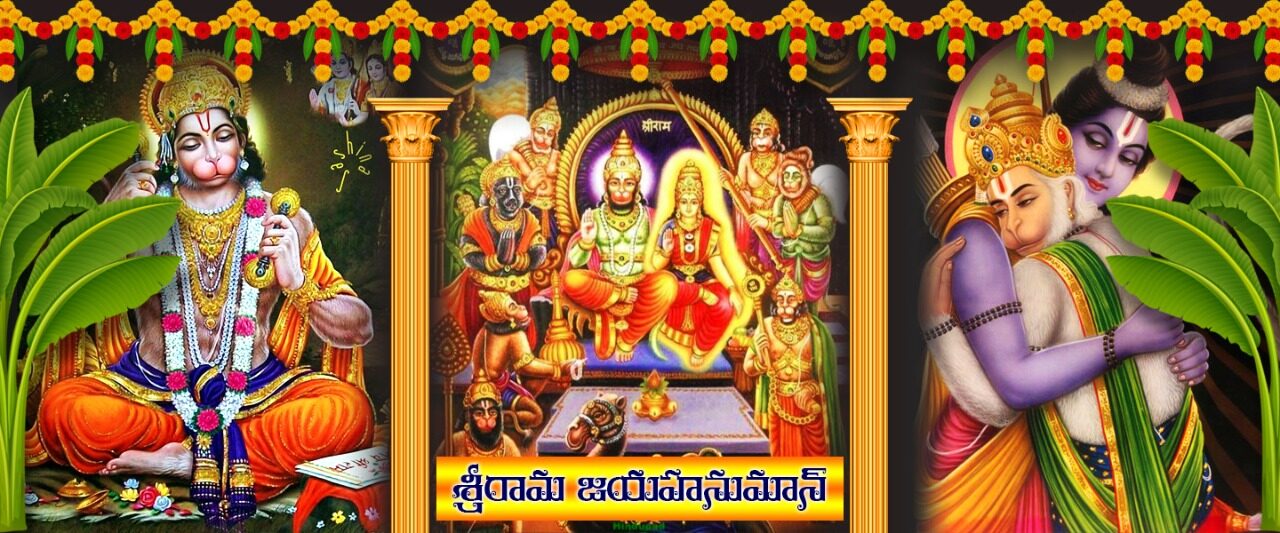
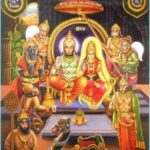

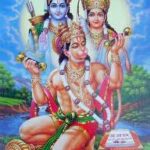
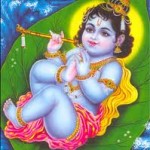
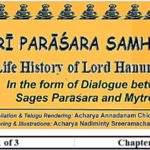

Be First to Comment